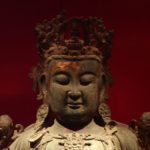Some folks say Buddhism is a religion. And it has many of the trappings of religion: large hierarchical institutions, canonical principles, male scholars who debate how many angels who can dance on the head of a pin, beliefs in concepts that cannot be proven, and so on.
Others say it is a philosophy, a more dispassionate, and perhaps intellectual, system of inquiry. Some followers of the current secular Buddhism movement might subscribe to that view.
I’d argue that Buddhism is about you and your mind.

I know, I know. What is “you” if it is not your mind? That question leads you down a rabbit hole into the very heart of Buddhism. What is this thing I identify as my self, and what is happening when we ask the self to look at the mind? Is the mind over there and self over here? Where? The questions go on and on, not looking at those kinds of questions intellectually, but instead very intimately. More intimate than sex. Getting at the very core by looking inside again and again in a simple, humble way.hose
Am I saying that monasteries, Dharma education, beliefs, good conduct and all the other things we associate with Buddhism should be done away with? Not at all. Everybody needs guidance and inspiration. At the end of the day, though, Buddhism is found in the moments when we apply all the techniques we have learned to our own minds and the timeless time that happens when we drop the technique and rest in the space beyond questions and answers.
